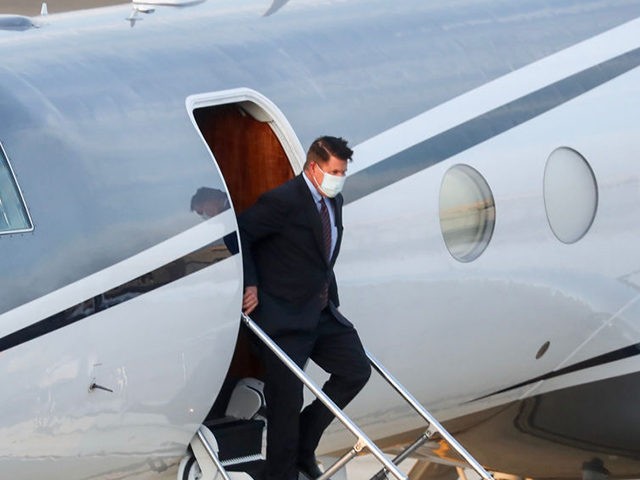U.S. Under Secretary of State for Economic Growth, Energy, and the Environment Keith Krach announced on Tuesday that he will visit Taiwan to attend a September 19 memorial service for former President Lee Teng-hui.
The Chinese Communist government was predictably infuriated by another high-level American official paying an official visit to Taiwan.
The State Department said Krach’s visit will honor Lee’s legacy by “continuing our strong bonds with Taiwan and its vibrant democracy through shared political and economic values.”
Lee, the pivotal democratic reformer who guided Taiwan away from decades of one-party authoritarianism, died at the age of 97 in July. U.S. Health and Human Services Secretary Alex Azar, the highest-ranking American official to visit Taiwan in four decades, visited a Taipei shrine dedicated to Lee’s memory in August.
The Taiwanese Foreign Ministry welcomed Krach, who arrived on the island on Thursday, and said he would meet with senior Taiwanese officials during his stay, including President Tsai Ing-wen. The ministry said Krach would hold meetings to fulfill Assistant Secretary of State for Asia and the Pacific David Stilwell’s commitment to strengthen economic cooperation between Taiwan and the United States.
The Chinese Communist Party (CCP) saw things very differently. China’s state-run Global Times railed on Wednesday that Krach’s visit will “bring misfortune to Taiwan” by provoking China to punish the island, perhaps even with a military assault:
The US and the island of Taiwan continue to adopt the “salami tactics” to expand the space for their ties, increasing US arms sales to the island, and attempting to force the Chinese mainland to swallow such a trend. They keep throwing stones into the water of the Taiwan Straits. But once they go too far, the stones may become torpedoes, increasing the uncertainties in the entire region, as well as the risks of drastic changes in the Taiwan Straits.
A strategic game of the century between China and the US is being shaped. This is a reality every country and every force in the Asia-Pacific region have to face. Among all regional forces, the Taiwan authorities are the most stupid. Smart ones would go after profit and avoid harm, seeking to butter their bread on both sides in the China-US game. But the Taiwan authorities are destroying their strategic maneuvering ability by completely siding with the US, turning itself into a pawn and a punching bag of the US, bearing the growing risk of an outbreak of a military conflict in the Taiwan Straits.
The Taiwan authorities often brag about “freedom and democracy” in the island, which are self-comforting empty slogans. The Taiwan authorities have no politically reliable strategic plans. They have no idea what Taiwan’s future will be like, and cannot predict what strategic resources Taiwan’s “freedom and democracy” could bring to the island to confront the mainland.
“Fully relying on the U.S. will make the island of Taiwan subject to the willful exploitation of the U.S.,” the Chinese Communist paper warned, taking all improvements in the trade and security relationship between Taipei and Washington as evidence of such exploitation and thundering that any recognition of sovereignty for Taiwan would be a violation of international law.
The broadside concluded that “people on the island will be plunged into misery. If that day comes, Taiwan authorities will be an unforgivable sinner for both the island and the rest of China.”
The CCP’s Taiwan Affairs Office issued similar warnings in another Global Times article, insisting Taiwanese affairs are purely a matter for Beijing to decide and denouncing Krach’s visit as “open interference from foreign forces.”
“The Democratic Progressive Party (DPP) authority ignores the opposition of people in the island, and insists on opening problematic agriculture imports from the U.S., which will harm public health on the island,” the foreign affairs office said.
The crack about “harm to public health” was a reference to Taiwan relaxing restrictions on an additive used in some U.S. pork products.
The Taiwan Affairs Office suggested the Trump administration could yet bow to pressure from Beijing and cancel Krach’s meetings with Taiwanese officials, even though he arrived in Taiwan on Thursday evening, local time.
China’s Ministry of Foreign Affairs insisted all official exchanges between the U.S. and Taiwan must “immediately stop” because China “firmly opposes” them. Chinese officials said aggressive military drills by the People’s Liberation Army (PLA) near Taiwan were intended to “deter interference” in Chinese affairs by “external forces” and Taiwanese “separatists.”

COMMENTS
Please let us know if you're having issues with commenting.